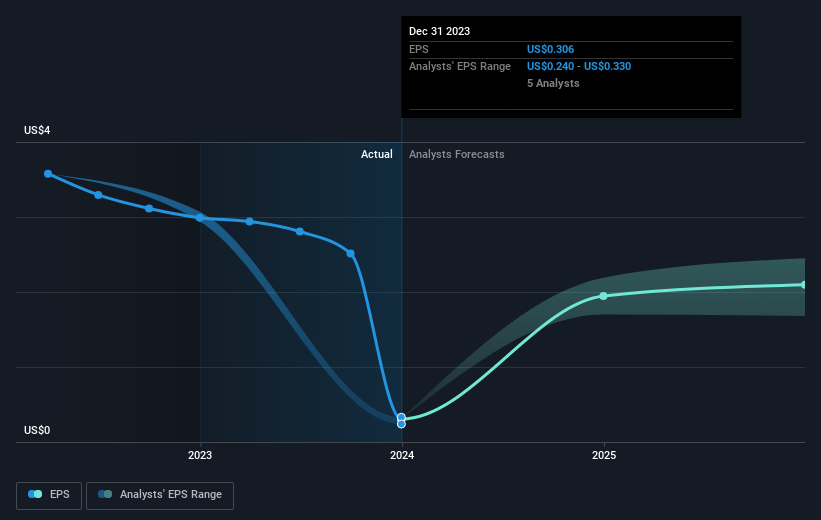Pacific Premier Bancorp (NASDAQ:PPBI) shareholders have endured a 42% loss from investing in the stock three years ago
In order to justify the effort of selecting individual stocks, it's worth striving to beat the returns from a market index fund. But its virtually certain that sometimes you will buy stocks that fall short of the market average returns. Unfortunately, that's been the case for longer term Pacific Premier Bancorp, Inc. (NASDAQ:PPBI) shareholders, since the share price is down 49% in the last three years, falling well short of the market return of around 12%. The falls have accelerated recently, with the share price down 20% in the last three months.
Now let's have a look at the company's fundamentals, and see if the long term shareholder return has matched the performance of the underlying business.
Check out our latest analysis for Pacific Premier Bancorp
To paraphrase Benjamin Graham: Over the short term the market is a voting machine, but over the long term it's a weighing machine. One way to examine how market sentiment has changed over time is to look at the interaction between a company's share price and its earnings per share (EPS).
During the three years that the share price fell, Pacific Premier Bancorp's earnings per share (EPS) dropped by 26% each year. In comparison the 20% compound annual share price decline isn't as bad as the EPS drop-off. So, despite the prior disappointment, shareholders must have some confidence the situation will improve, longer term. This positive sentiment is also reflected in the generous P/E ratio of 74.15.
The image below shows how EPS has tracked over time (if you click on the image you can see greater detail).
Dive deeper into Pacific Premier Bancorp's key metrics by checking this interactive graph of Pacific Premier Bancorp's earnings, revenue and cash flow.
What About Dividends?
It is important to consider the total shareholder return, as well as the share price return, for any given stock. The TSR incorporates the value of any spin-offs or discounted capital raisings, along with any dividends, based on the assumption that the dividends are reinvested. It's fair to say that the TSR gives a more complete picture for stocks that pay a dividend. We note that for Pacific Premier Bancorp the TSR over the last 3 years was -42%, which is better than the share price return mentioned above. This is largely a result of its dividend payments!
A Different Perspective
Pacific Premier Bancorp shareholders gained a total return of 8.0% during the year. But that was short of the market average. On the bright side, that's still a gain, and it is certainly better than the yearly loss of about 1.6% endured over half a decade. So this might be a sign the business has turned its fortunes around. It's always interesting to track share price performance over the longer term. But to understand Pacific Premier Bancorp better, we need to consider many other factors. Case in point: We've spotted 2 warning signs for Pacific Premier Bancorp you should be aware of.
We will like Pacific Premier Bancorp better if we see some big insider buys. While we wait, check out this free list of growing companies with considerable, recent, insider buying.
Please note, the market returns quoted in this article reflect the market weighted average returns of stocks that currently trade on American exchanges.
Have feedback on this article? Concerned about the content? Get in touch with us directly. Alternatively, email editorial-team (at) simplywallst.com.
This article by Simply Wall St is general in nature. We provide commentary based on historical data and analyst forecasts only using an unbiased methodology and our articles are not intended to be financial advice. It does not constitute a recommendation to buy or sell any stock, and does not take account of your objectives, or your financial situation. We aim to bring you long-term focused analysis driven by fundamental data. Note that our analysis may not factor in the latest price-sensitive company announcements or qualitative material. Simply Wall St has no position in any stocks mentioned.

